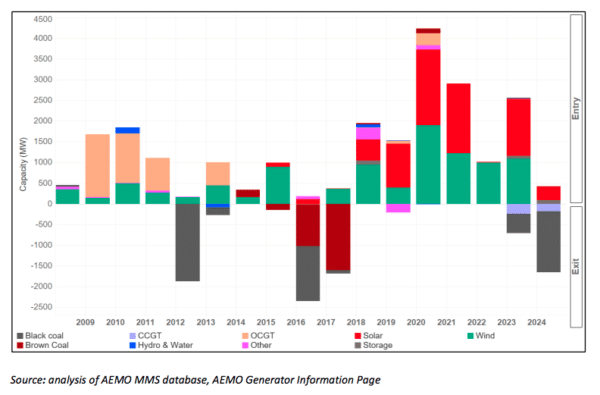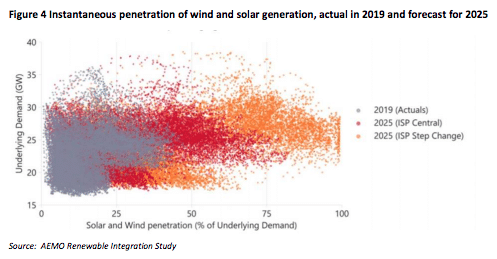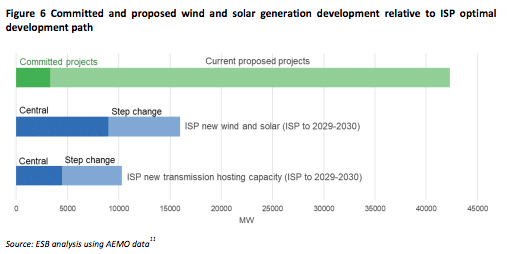In 2019, Australia’s Energy Security Board was given the unenviable task of redesigning the country’s energy systems to transition away from fossil fuels to an infinitely more complicated renewable based system. Last Friday, the Board published its long awaited ‘options’ for achieving this, promptly stirring outcry with its proposal of what essentially amounts to a subsidy for coal-fired power stations.
Today, in the first briefing regarding the Post 2025 Market Design Options Paper, Dr Kerry Schott, the Board’s Independent Chair, minced no words.
“Australia really is in a situation where we don’t have a lot of options,” she said, frankly. “It’s going to be a bit messy through this next decade or so.”
Her comment was in response to a question building on the estimation that Australia’s National Electricity Market (NEM) can only maintain its reliability with a renewables penetration of no more than 75%. The key question then is how does Australia handle this.

Energy Security Board
Can the NEM be both clean and reliable
Naturally, clean energy advocates want to see the system shored by green technologies only – a position not lost on Schott. Unfortunately, the required technology and infrastructure is simply not yet there and in the interim, we need a Plan B, she outlined. Which is why the Board is proposing what it’s calling a “physical certificate scheme” for reliability.
“I know a lot of people people hate this – but [it’s being proposed to] leave open some management of [coal station] exits so that we can actually keep the system going while its occurring,” Schott said.
Essentially, Schott posited that the pathway as a means to “keep everything together while the technology catches up.”
“As coal leaves the system, it will be replaced by a mixture of pumped hydro and gas. That gas won’t necessarily run all the time, but will certainly be available to come up when its needed, and similarly with pumped hydro.”
“In due course, we will have hydrogen to complement the gas and possibly in due course replace it altogether,” she added.
Big grid-stabilising batteries are another touted clean energy favourite. While Schott noted that big batteries are proving economically lucrative and are certainly helpful for stabilising the grid, she said their limited durations mean that, as it stands, they just aren’t a viable replacement.
“[Batteries have a] duration at the moment that’s largely limited to about four hours and that will not be sufficient to get us through… so we do need backup,” she said.
The Board’s coal ‘subsidy,’ Schott said, is as its core about ensuring there is an “orderly” exit of traditional generators. This is especially important as coal becomes increasingly unviable economically (wind and solar power is now cheaper than coal), a fact which has already led numerous plants to announce early closures.

Expanding on the Board’s other focus areas
While the Board’s “physical certificate scheme” or coal-subsidy pathway has proven the most controversial and therefore received the most attention during the briefing, its Options Paper focussed on another three key areas in addition to coal-station retirements. Those include system security, the integration of distributed energy resources, and transmission and grid congestion.
Schott noted these focus areas are at very different stages of development. “The whole Distributed Energy Resources space is still very undeveloped and it’s an area where we need more work on going forward,” Schott said. On the other hand, the Chair noted system security was in a “pretty good” position with clear solutions.
Transmission line rules, she said, were a constant source of complaint, describing financial transmission rights and regional pricing rules as “close to satanic.”
“There are problems in that space that do need to be tackled,” she said. “If you’ve got any better ideas, let us know!”
‘If you’ve got any better ideas, let us know’
This sentiment was repeated by each of the Board experts who spoke at the briefing, all of which stressed that feedback is not only welcome but encouraged.
Schott noted that Australia is “clearly” already on a trajectory towards a high penetration of renewables – the scenario the Australian Electricity Market Operator called, in its Integrated System Plan, a ‘step change.’
“If anything, we have more renewables than that,” Schott said. “But people don’t always want to hear it, for one reason or another.”

This fact, while wonderful for decarbonisation, means that Australia is catapulting into what David Swift, the Board’s Deputy Chair, described as an “overall more complicated system” – which urgently needs addressing but equally has no neat resolutions.
The publication of the Board’s Options Paper on Friday marked the beginning of the final feedback stage before the Board makes its recommendations to government ministers in the middle of the year.
Following these recommendations, the Energy Security Board is set to disband. The question of whether that’s a good idea was also put to Schott during question time, to which she replied “I don’t actually have a strong view about it.”
Schott said market bodies are currently working well together. Nonetheless, the question remains as to whether the Board is necessary to “corral the cats,” as Schott put it, or if they can be left to their own devices now that a plan has been laid out.
This, Schott said, is a decision for ministers, who she expected will consider the issue in the second half of this year and not a minute earlier.
This content is protected by copyright and may not be reused. If you want to cooperate with us and would like to reuse some of our content, please contact: editors@pv-magazine.com.









Off-grid homes have been viable for decades: Wind Turbine(s), Solar PV panels, Battery Storage, and a backup generator. What is different now is the cost. Saves money to do this in many areas.
Not complicated. Same for grid as a whole.
1. Some homes, businesses, and towns just go off-grid. Already happening.
2. You need to be able to trade power from one area to another, so excess RE can be used where there is insufficient RE. Figure it out and build it. We trade power now. Figure it out. Gitter done!
3. Yep, just like the off-grid home, you’ll need backup power. I can see why coal would be chosen in Australia, cheaper than NG there. Gitter done! Figure out how to spin up your coal plants while still using battery power. Can you do that? No? If not then use NG instead. Less wear and tear, less fuel cost, if they do not run often.
A. Batteries: >>“[Batteries have a] duration at the moment that’s largely limited to about four hours and that will not be sufficient to get us through… so we do need backup,” she said.<>Her comment was in response to a question building on the estimation that Australia’s National Electricity Market (NEM) can only maintain its reliability with a renewables penetration of no more than 75%. The key question then is how does Australia handle this.<75% renewable electricity and quit studying whether it can be done or not. Just do it! Adjust you course as necessary. Again, I bet many areas in Australia can achieve >75% at lower cost than your current fossil centralized grid. I could be wrong. Point it out with some Solar PV and Wind facts please.